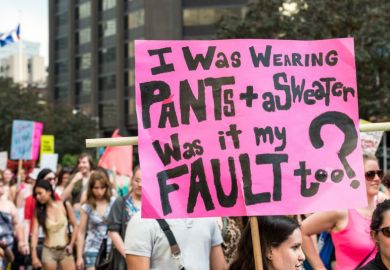The Biden administration’s long-awaited strategy to increase protections for student victims of sexual harassment is facing a potential pushback from the US Supreme Court.
Just as the Biden team is due to announce its regulatory reversal of the Trump administration’s scaling-back of victims’ rights, the nation’s conservative-dominated top court is signalling its intent to hear a case that would let it step deeply into the topic.
The case involves public high school students in the Washington DC area, although the implications apply equally to the post-secondary arena as part of Title IX, the federal law that forbids sex-based discrimination in education programmes.
The case offers the Supreme Court a chance to clarify at least two main questions that strike at the heart of Title IX: the standard by which an educational institution should consider an act of harassment or assault to have occurred, and the definition of what corresponding action it then must take.
“The Supreme Court set the baseline standard” through the decisions it issued in the 1990s, said Steven Richard, a lawyer who heads the higher education and Title IX teams at Nixon Peabody, a global law firm. “But the baseline standard has left a lot of questions in interpretation.”
The case now facing consideration by the top court was brought on behalf of a female student who reported persistent sexual contact against her will by a male student on a long school bus ride, and then sought accommodations to prevent her from encountering the student in their ongoing school activities.
After reviewing her complaint, school administrators felt that they lacked the evidence to agree that the incident on the bus had amounted to sexual assault.
The Supreme Court has just asked the Biden administration for its opinion on the case, which is often seen as a sign of the court’s intent to accept a case for review and decision.
One major question in the case, Mr Richard said, was whether an educational institution could use its own standard for deciding if an act of sexual harassment or assault had occurred, or if it had to use a particular objective standard. The second question, he said, was whether the victim had to endure a second act of harassment or assault to show that the institution was failing to guard against a known threat, or if there could be other ways of showing an institutional failure to protect a vulnerable individual.
In its response, the Biden administration is likely to demonstrate its previously expressed desire to shore up the rights of victims, Mr Richard said. “I think that the Biden administration would say that the knowledge standard should be objective, and that the vulnerability language is there for a purpose – that you don’t have to wait for a second incident to hold someone liable, if kids are walking around campuses in fear,” he said. “The schools need to understand that, and can be held liable for it.”
But the Supreme Court, with a 6-3 conservative majority that has been threatening to upend long-established precedents on major social issues, is expected to take a more sympathetic approach towards institutional authority. The non-profit legal advocacy organisation Public Justice – which is representing the female student – has warned that the prospect of Supreme Court involvement in the case threatens the end of key Title IX protections.
Other advocates contend that any Supreme Court action to leave in place the appellate-level ruling – a loss for the high school and the prospect of costly penalties under Title IX – would badly harm all educational institutions.
Register to continue
Why register?
- Registration is free and only takes a moment
- Once registered, you can read 3 articles a month
- Sign up for our newsletter
Subscribe
Or subscribe for unlimited access to:
- Unlimited access to news, views, insights & reviews
- Digital editions
- Digital access to THE’s university and college rankings analysis
Already registered or a current subscriber? Login







